非谓语动词一览表
非谓语表
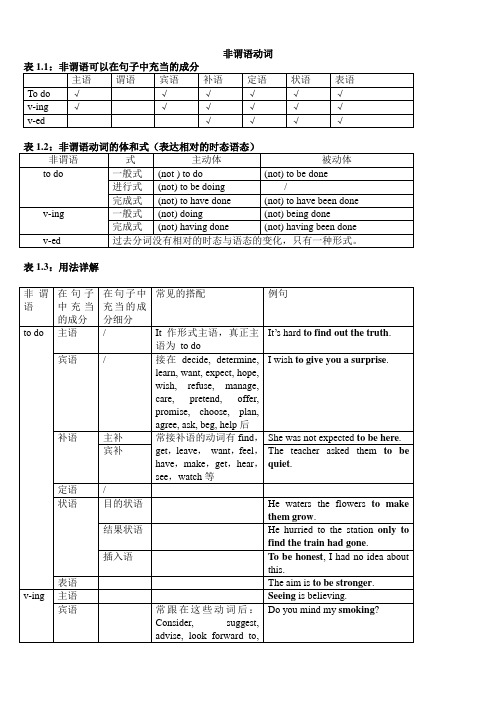
Movedbyhisspeech,manypeoplevolunteeredtohelpinthework.
结果状语
The girl met with an accident when crossing the road,wounded in the head.
方式状语
Heentered,accompaniedbyhissecretary.
The housebeing builtwill be a meeting hall.
状语
目的状语
They cameto paya visit to a famous museum here.
时间状语
Hearing the good news, my mother couldn’t help laughing.
I wishto give you a surprise.
补语
主补
常接补语的动词有find,get,leave,want,feel,have,make,get,hear,see,watch等
She was not expectedto be here.
宾补
The teacher asked themto be quiet.
常接补语的动词有find,get,leave,want,feel,have,make,get,hear,see,watch等
He was foundtied to a tree.
宾补
He had his bikestolen.
定语
Can you see thefallenleaves?
状语
时间状语
Whenasked her future plans, the girl said that she wanted to be a teacher.
英语非谓语动词总结表
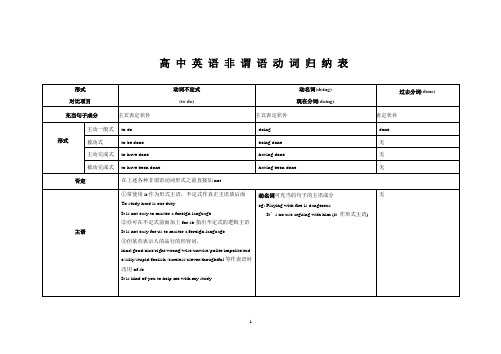
eg:spoken English
running water
a book writen by a peasant
the boy standing under the tree
宾语
①可以直接跟不定式作宾语,这类动词有:want/like/hope/wish/prefer/hate/decide/expect/desire/try/
She was the first person to think of the idea.
②当名词被序数词或the only、the next、the last修饰,且该名词是作定语的非谓语的执行者时,用不定式主动形式做定语。
She was the first woman to win the gold medal in the Olympic Games.
②亦可在不定式前面加上for sb.指出不定式的逻辑主语
It is not easy for us to master a foreign language.
③但某些表示人的品行的形容词,kind/good/nice/right/wrong/wise/unwise/polite/impolite/rude/silly/stupid/foolish /careless/clever/thoughtful等作表语时改用of sb.
manage/start/begin/remember/forget/ask/offer/continue/agree/choose/promise/mean/pretend等
如:I want to borrow your dictionary.
②常使用it作为形式宾语,不定式作真正主语放后面
如:I find it interesting to study English.
非谓语动词一览表
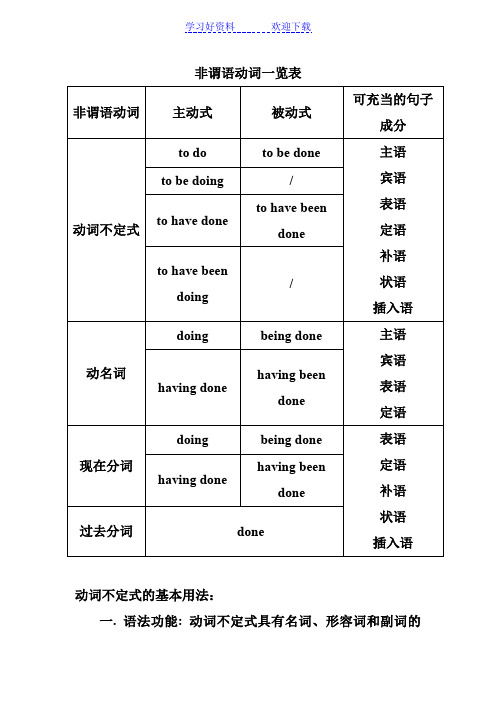
非谓语动词一览表动词不定式的基本用法:一. 语法功能: 动词不定式具有名词、形容词和副词的特征,因此在句中可作主语、宾语、表语、定语、宾语补足语(主语补足语)、状语以及插入语(独立成分),唯独不可作谓语。
(主语)To scold her would not be just.(宾语)We are planning to build a Disney park here.(宾补)They hurriedly ended the meeting, leaving many problems to be settled.(表语)Our most urgent task is to make a careful analysis of the present situation.仔细分析当前的形势是我们最迫切的任务。
(定语)Do you have anything else to add? 还有什么要补充的吗(目的状语)Learn from past mistakes to avoid future ones. 惩前毖后。
(结果状语)He made a long speech only to show his ignorance of the subject.他大讲了一通,只暴露他对这门学科的无知。
(程度状语)I don’t know her to speak to.我认识她还不到能与她谈话的程度。
(原因状语) We shall be happy to co-operate with you in the work.(独立成分) To put it another way, do you like him?To be honest,I don’t know anything about it.I. 作主语:1. To say is easier than to do. =Saying is easier than doing.2. To see is to believe. =Seeing is believing.3. How to go there h asn’t been decided yet.4. Who to blame for the traffic accident is still a puzzle.5. Whether to go or stay is not known.6. It is important to study English well and go to college.7. It is our duty to give a hand to people in trouble.8. It takes me three hours to do house cleaning on Sundays.9. To master a foreign language is very important。
非谓语表格
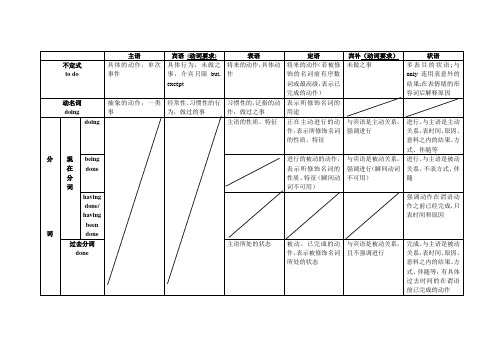
宾语(动词要求)
表语
定语
宾补(动词要求)
状语
不定式
to do
具体的动作,单次事件
具体行为,未做之事,介宾只限but, except
将来的动作,具体动作
将来的动作(若被修饰的名词前有序数词或最高级,表示已完成的动作)
未做之事
多表目的状语;与only连用表意外的结果;在表情绪的形容词后解释原因
动名词
进行的被动的动作,表示所修饰名词的性质、特征(瞬间动词不可用)
与宾语是被动关系,强调进行(瞬间动词不可用)
进行、与主语是被动关系,不表方式、伴随
having done/ having been done
强调动作在谓语动作之前已经完成,只表时间和原因
过去分词done
主语所处的状态
被动、已完成的动作,表示被修饰名词所处的状态
与宾语是被动关系,且不强调进行
完成、与主语是被动关系,表时间、原因、意料之内的结果、方式、伴随等,有具体过去时间的在谓语前已完成的动作
doing
抽象的动作,一类事
经常性、习惯性的行为,做过的事
习惯性的,泛指的动作,做过之事
表示所修饰名词的用途
分
词
现
在
分
词
doing
主语的性质、特征
正在主动进行的动作,表示所修饰名词的性质、特征
与宾语是主动关系,强调进行
进行、与主语是主动关系,表时间、原因、意料之内的结果、方式、伴随等
being done
(完整版)非谓语动词归纳总结
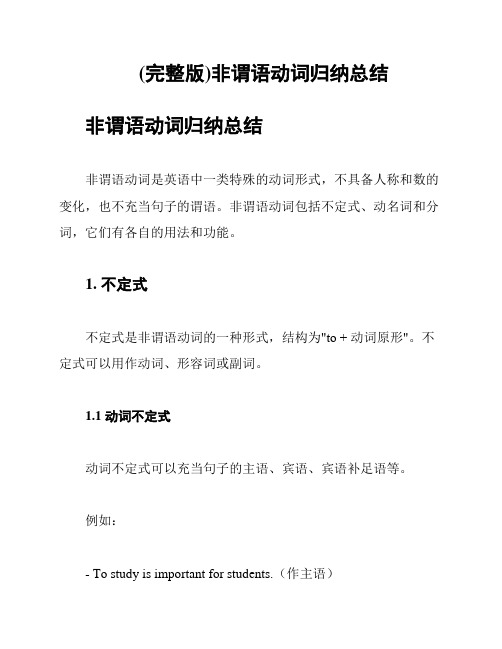
(完整版)非谓语动词归纳总结非谓语动词归纳总结非谓语动词是英语中一类特殊的动词形式,不具备人称和数的变化,也不充当句子的谓语。
非谓语动词包括不定式、动名词和分词,它们有各自的用法和功能。
1. 不定式不定式是非谓语动词的一种形式,结构为"to + 动词原形"。
不定式可以用作动词、形容词或副词。
1.1 动词不定式动词不定式可以充当句子的主语、宾语、宾语补足语等。
例如:- To study is important for students.(作主语)- I want to learn English.(作宾语)- She asked me to help her.(作宾语补足语)1.2 形容词不定式形容词不定式用于修饰名词或代词。
例如:- I have a book to read.(修饰名词)- He is the man to trust.(修饰代词)1.3 副词不定式副词不定式用于修饰动词、形容词或副词。
例如:- She worked hard to pass the exam.(修饰动词)- He is happy to see you.(修饰形容词)- She walked quickly to catch the bus.(修饰副词)2. 动名词动名词是非谓语动词的一种形式,结构为动词的现在分词形式。
动名词可以充当句子的主语、宾语、宾语补足语等。
例如:- Swimming is good exercise.(作主语)- I enjoy playing basketball.(作宾语)- She kept on talking.(作宾语补足语)3. 分词分词是非谓语动词的一种形式,根据时态和完成程度的不同,分词分为现在分词和过去分词。
3.1 现在分词现在分词用于表示主动或进行的动作。
例如:- The running boy is my brother.(作定语)- She stood there, crying.(作状语)3.2 过去分词过去分词用于表示被动或完成的动作。
非谓语动词的用法总结表格
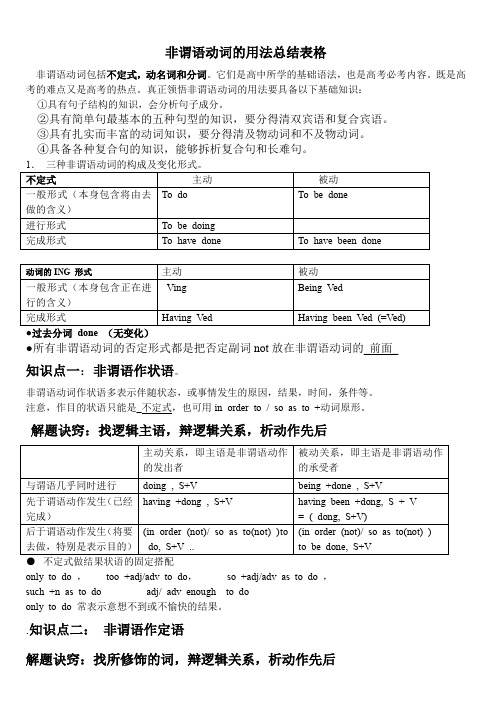
非谓语动词的用法总结表格非谓语动词包括不定式,动名词和分词。
它们是高中所学的基础语法,也是高考必考内容。
既是高考的难点又是高考的热点。
真正领悟非谓语动词的用法要具备以下基础知识:①具有句子结构的知识,会分析句子成分。
②具有简单句最基本的五种句型的知识,要分得清双宾语和复合宾语。
③具有扎实而丰富的动词知识,要分得清及物动词和不及物动词。
④具备各种复合句的知识,能够拆析复合句和长难句。
●所有非谓语动词的否定形式都是把否定副词not放在非谓语动词的_前面_知识点一:非谓语作状语。
非谓语动词作状语多表示伴随状态,或事情发生的原因,结果,时间,条件等。
注意,作目的状语只能是_不定式,也可用in order to / so as to +动词原形。
解题诀窍:找逻辑主语,辩逻辑关系,析动作先后●不定式做结果状语的固定搭配only to do ,too +adj/adv to do,so +adj/adv as to do ,such +n as to do adj/ adv enough to doonly to do 常表示意想不到或不愉快的结果。
.知识点二:非谓语作定语解题诀窍:找所修饰的词,辩逻辑关系,析动作先后,面须有相应的介词。
2. 不定式用来修饰名词,表动作未发生。
3. 不定式用来修饰被序数词,最高级等限定的中心词。
知识点三:非谓语动词做补语解题技巧:记固定搭配,辩逻辑关系不定式和分词作宾语补足语(we consider him to be a nice guy)或主语补足语(He is considered to be a nice guy)是考察的重点.做题时一要熟记固定搭配,还要仔细分析非谓语所表示的动作与谓语动作发生的先后问题。
A 固定句型sb/sth be said/believed/ reported/ considered/ thought to do /to be doing /to have done 要分清.B 弄清以下搭配及其意义1.感官动词see, watch, observe, hear, listen to, notice等后面的宾补有3种形式(do/doing/done),doing表主动或正在进行,done表被动或完成,do表主动和完成(被动句中to 还原)。
非谓语动词时态和语态句法 功能一览表,简洁,明细,容量大
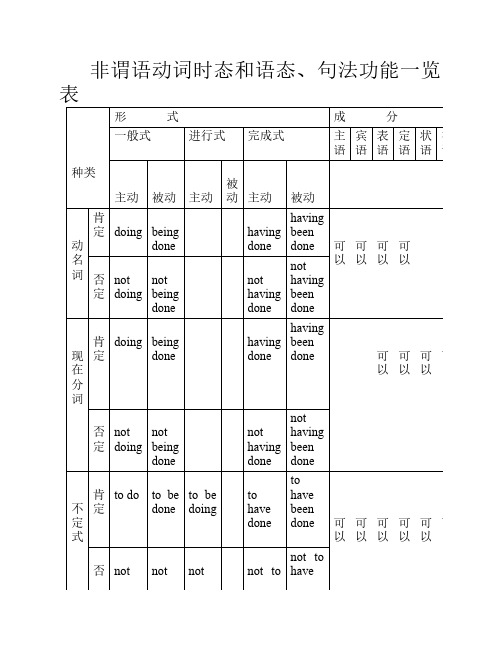
肯 to do 不定 定 式
to be to be done doing
to
to
have
have been
done done 可 可 可 可 可 可
以以以以以以
否 not not not
not to not to have
定 to do
过 去 分 词
to be to be done doing
have been done done
not 以 以 以 以 not having having been done done
肯 doing being
现定
done
在
分
词
having having beБайду номын сангаасn done done
可可可可 以以以以
否 not not 定 doing being
done
not not having having been done done
非谓语动词时态和语态、句法功能一览 表
形
式
一般式
进行式 完成式
成
分
主宾表定状补 语语语语语语
种类 被
主动 被动 主动 动 主动 被动
肯
定 doing being
动
done
名
词 否 not not
定 doing being
done
having having been done done 可 可 可 可
可可可可 以以以以
非谓语动词时态和语态、句法功能一览 表
形
式
一般式
进行式 完成式
成
分
主宾表定状补 语语语语语语
种类 被
主动 被动 主动 动 主动 被动
非谓语动词(完整版)

非谓语动词(完整版)非谓语动词(完整版)一、单项选择非谓语动词1.The woman began to cry when asked how her husband was injured.解析:本句中,how引导的是宾语从句,asked是谓语动词,所以用过去分词作状语,表示被动,故选A。
2.XXX tasted terrible。
so it was thrown away by the child.解析:本句中,taste与主语medicine是主动关系,而且taste是系动词无被动,因此用现在分词tasting作状语,表示主动,故选B。
3.A XXX。
XXX for over half an hour.解析:本句中,leaving与主语laugh构成主动关系,表示结果,所以用现在分词,故选C。
4.When asked for his views about his teaching job。
Philip said he found it very interesting and rewarding.解析:本句中,when引导的是省略句,完整的是when he was asked his view about his job as a teacher,这里当从句中的主语与主句的主语一致,并且从句的谓语动词有be时,这时从句的主语与be同时省略,故选B。
二、改写句子1.Being asked how her husband was injured。
XXX.2.XXX.3.A XXX for over half an hour.4.Philip found XXX when he was asked for his views about it.1.The company has decided to implement a new policy to ce the use of plastic bags。
非谓语动词一览表
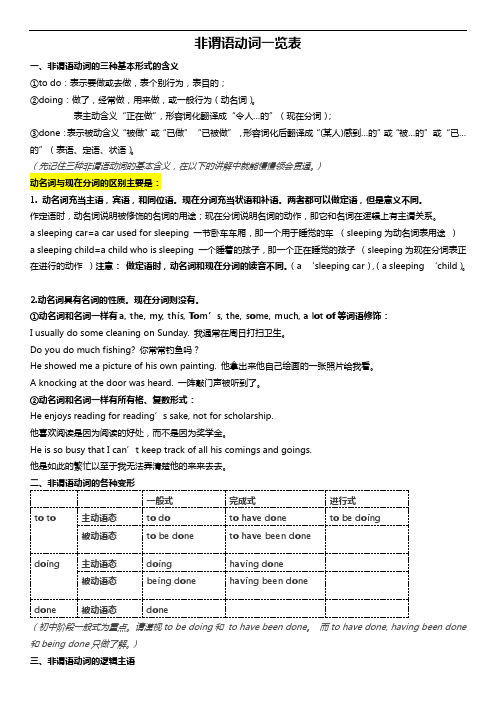
非谓语动词一览表一、非谓语动词的三种基本形式的含义①to do:表示要做或去做,表个别行为,表目的;②doing:做了,经常做,用来做,或一般行为(动名词)。
表主动含义“正在做”,形容词化翻译成“令人…的”(现在分词);③done:表示被动含义“被做”或“已做”“已被做”,形容词化后翻译成“(某人)感到…的”或“被…的”或“已…的”(表语、定语、状语)。
(先记住三种非谓语动词的基本含义,在以下的讲解中就能慢慢领会贯通。
)动名词与现在分词的区别主要是:1. 动名词充当主语,宾语,和同位语。
现在分词充当状语和补语。
两者都可以做定语,但是意义不同。
作定语时,动名词说明被修饰的名词的用途;现在分词说明名词的动作,即它和名词在逻辑上有主谓关系。
a sleeping car=a car used for sleeping 一节卧车车厢,即一个用于睡觉的车(sleeping为动名词表用途)a sleeping child=a child who is sleeping 一个睡着的孩子,即一个正在睡觉的孩子(sleeping为现在分词表正在进行的动作)注意:做定语时,动名词和现在分词的读音不同。
(a ‘sleeping car),(a sleeping ‘child)。
2.动名词具有名词的性质。
现在分词则没有。
①动名词和名词一样有a, the, my, this, Tom’s, the, some, much, a lot of等词语修饰:I usually do some cleaning on Sunday. 我通常在周日打扫卫生。
Do you do much fishing? 你常常钓鱼吗?He showed me a picture of his own painting. 他拿出来他自己绘画的一张照片给我看。
A knocking at the door was heard. 一阵敲门声被听到了。
②动名词和名词一样有所有格、复数形式:He enjoys reading for reading’s sake, not for scholarship.他喜欢阅读是因为阅读的好处,而不是因为奖学金。
非谓语动词
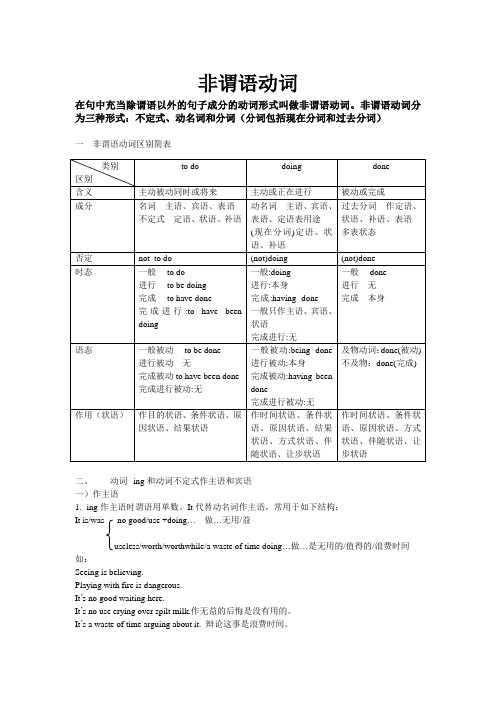
非谓语动词在句中充当除谓语以外的句子成分的动词形式叫做非谓语动词。
非谓语动词分为三种形式:不定式、动名词和分词(分词包括现在分词和过去分词)一 非谓语动词区别简表二、动词--ing和动词不定式作主语和宾语一)作主语1. -ing作主语时谓语用单数。
It代替动名词作主语,常用于如下结构:It is/was no good/use +doing…做…无用/益useless/worth/worthwhile/a waste of time doing…做…是无用的/值得的/浪费时间如:Seeing is believing.Playing with fire is dangerous.It’s no good waiting here.It’s no use crying over spilt milk.作无益的后悔是没有用的。
It’s a waste of time arguing about it. 辩论这事是浪费时间。
There is no point (in)doing the job.做这工作毫无意义。
2. 动词不定式作主语时,句子的谓语动词常用单数,其位置有以下两种:(1)把不定式置于句首。
如:To get there by bike will take us half an hour.(2)常用it作形式主语,把真正的主语不定式置于句后,常用于下列句式中。
如:①It+be+名词+to do It's our duty to take good care of the old.②It takes sb+some time+to do How long did it take you to finish the work?③It+be+形容词+for sb+to do It is difficult for us to finish writing the composition in a quarter of an hour. 形容描述事物时,用介词for④It+be+形容词+of sb+to do It is stupid of you to write down everything the teacher says. 形容描述人物性格特征时,用介词of⑤It seems(appears)+形容词+to do It seemed impossible to save money.在句型③中,常用表示客观情况的形容词,如:difficult, easy, hard, important, impossible, necessary 等;It seemed selfish of him not to give them anything. 他不给他们任何东西,这显得太自私了。
非谓语动词最全总结
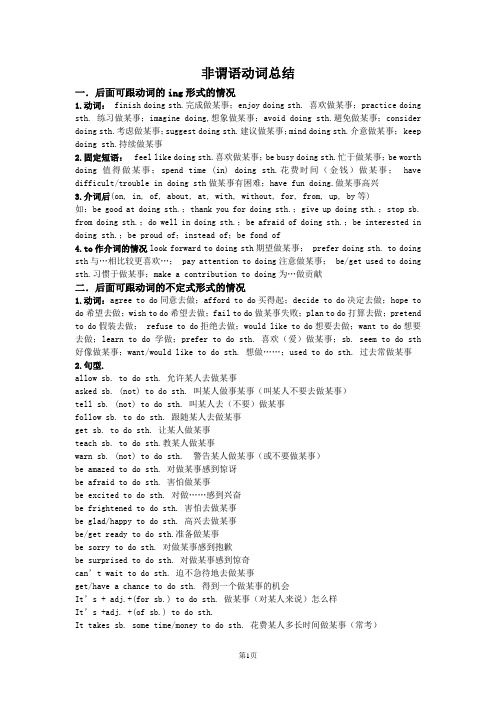
非谓语动词总结一.后面可跟动词的ing形式的情况1.动词:finish doing sth.完成做某事;enjoy doing sth. 喜欢做某事;practice doing sth. 练习做某事;imagine doing,想象做某事;avoid doing sth.避免做某事;consider doing sth.考虑做某事;suggest doing sth.建议做某事;mind doing sth.介意做某事; keep doing sth.持续做某事2.固定短语: feel like doing sth.喜欢做某事;be busy doing sth.忙于做某事;be worth doing 值得做某事;spend time (in) doing sth.花费时间(金钱)做某事;have difficult/trouble in doing sth做某事有困难;have fun doing.做某事高兴3.介词后(on, in, of, about, at, with, without, for, from, up, by等)如:be good at doing sth.;thank you for doing sth.;give up doing sth.;stop sb. from doing sth.;do well in doing sth.;be afraid of doing sth.;be interested in doing sth.;be proud of;instead of;be fond of4.to作介词的情况look forward to doing sth期望做某事; prefer doing sth. to doing sth与…相比较更喜欢…; pay attention to doing注意做某事; be/get used to doing sth.习惯于做某事;make a contribution to doing为…做贡献二.后面可跟动词的不定式形式的情况1.动词:agree to do同意去做;afford to do买得起;decide to do决定去做;hope to do希望去做;wish to do希望去做;fail to do做某事失败;plan to do打算去做;pretend to do假装去做; refuse to do拒绝去做;would like to do想要去做;want to do想要去做;learn to do 学做;prefer to do sth. 喜欢(爱)做某事;sb. seem to do sth 好像做某事;want/would like to do sth. 想做……;used to do sth. 过去常做某事2.句型.allow sb. to do sth. 允许某人去做某事asked sb. (not) to do sth. 叫某人做事某事(叫某人不要去做某事)tell sb. (not) to do sth. 叫某人去(不要)做某事follow sb. to do sth. 跟随某人去做某事get sb. to do sth. 让某人做某事teach sb. to do sth.教某人做某事warn sb. (not) to do sth. 警告某人做某事(或不要做某事)be amazed to do sth. 对做某事感到惊讶be afraid to do sth. 害怕做某事be excited to do sth. 对做……感到兴奋be frightened to do sth. 害怕去做某事be glad/happy to do sth. 高兴去做某事be/get ready to do sth.准备做某事be sorry to do sth. 对做某事感到抱歉be surprised to do sth. 对做某事感到惊奇can’t wait to do st h. 迫不急待地去做某事get/have a chance to do sth. 得到一个做某事的机会It’s + adj.+(for sb.) to do sth. 做某事(对某人来说)怎么样It’s +adj. +(of sb.) to do sth.It takes sb. some time/money to do sth. 花费某人多长时间做某事(常考)It’s best for sb. to do sth. 对某人来说做某事是最好的It’s time for sb. to do sth. 是某人做某事的时候了too…(for sb.) to …太……以致不能…… ==not… enough to doprefer to do sth. rather than do sth. 宁愿……而不愿……(常考)something to eat/drink 一些吃/喝的东西(词不定式放在something等后修饰这些Sth. is hard/difficult/easy to do 做好某事很难/容易take turns to do sth. 轮流做……There is no time (for sb. ) to do sth. 对(某人来说)没时间做某事了There is no need (for sb.) to do sth. 对某人来说没必要做某事try/do one’s best to do sth. 尽力去做某事三、后既能跟不定式也能跟动名词的情况:1、后加不定式或动名词意思相近的动词有些动词接doing和to do意义相近像like(喜欢),love(喜欢),hate(憎恨),prefer(宁可),begin(开始),start(开始),continue(继续)等。
非谓语动词汇总
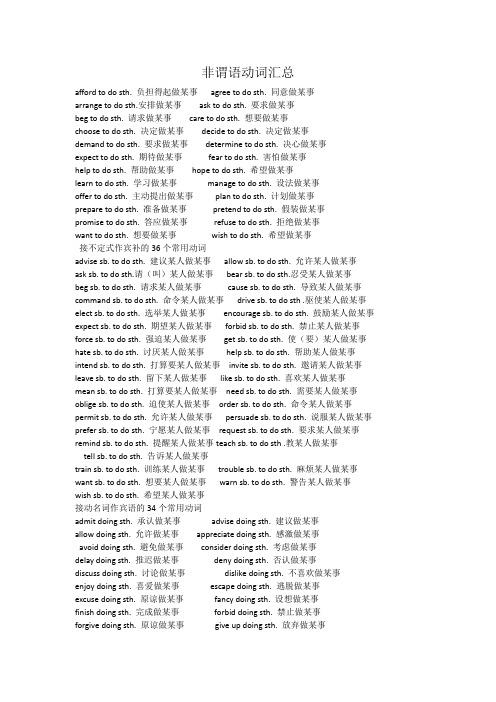
非谓语动词汇总afford to do sth. 负担得起做某事agree to do sth. 同意做某事arrange to do sth.安排做某事ask to do sth. 要求做某事beg to do sth. 请求做某事care to do sth. 想要做某事choose to do sth. 决定做某事decide to do sth. 决定做某事demand to do sth. 要求做某事determine to do sth. 决心做某事expect to do sth. 期待做某事fear to do sth. 害怕做某事help to do sth. 帮助做某事hope to do sth. 希望做某事learn to do sth. 学习做某事manage to do sth. 设法做某事offer to do sth. 主动提出做某事plan to do sth. 计划做某事prepare to do sth. 准备做某事pretend to do sth. 假装做某事promise to do sth. 答应做某事refuse to do sth. 拒绝做某事want to do sth. 想要做某事wish to do sth. 希望做某事接不定式作宾补的36个常用动词advise sb. to do sth. 建议某人做某事allow sb. to do sth. 允许某人做某事ask sb. to do sth.请(叫)某人做某事bear sb. to do sth.忍受某人做某事beg sb. to do sth. 请求某人做某事cause sb. to do sth. 导致某人做某事command sb. to do sth. 命令某人做某事drive sb. to do sth .驱使某人做某事elect sb. to do sth. 选举某人做某事encourage sb. to do sth. 鼓励某人做某事expect sb. to do sth. 期望某人做某事forbid sb. to do sth. 禁止某人做某事force sb. to do sth. 强迫某人做某事get sb. to do sth. 使(要)某人做某事hate sb. to do sth. 讨厌某人做某事help sb. to do sth. 帮助某人做某事intend sb. to do sth. 打算要某人做某事invite sb. to do sth. 邀请某人做某事leave sb. to do sth. 留下某人做某事like sb. to do sth. 喜欢某人做某事mean sb. to do sth. 打算要某人做某事need sb. to do sth. 需要某人做某事oblige sb. to do sth. 迫使某人做某事order sb. to do sth. 命令某人做某事permit sb. to do sth. 允许某人做某事persuade sb. to do sth. 说服某人做某事prefer sb. to do sth. 宁愿某人做某事request sb. to do sth. 要求某人做某事remind sb. to do sth. 提醒某人做某事teach sb. to do sth .教某人做某事tell sb. to do sth. 告诉某人做某事train sb. to do sth. 训练某人做某事trouble sb. to do sth. 麻烦某人做某事want sb. to do sth. 想要某人做某事warn sb. to do sth. 警告某人做某事wish sb. to do sth. 希望某人做某事接动名词作宾语的34个常用动词admit doing sth. 承认做某事advise doing sth. 建议做某事allow doing sth. 允许做某事appreciate doing sth. 感激做某事avoid doing sth. 避免做某事consider doing sth. 考虑做某事delay doing sth. 推迟做某事deny doing sth. 否认做某事discuss doing sth. 讨论做某事dislike doing sth. 不喜欢做某事enjoy doing sth. 喜爱做某事escape doing sth. 逃脱做某事excuse doing sth. 原谅做某事fancy doing sth. 设想做某事finish doing sth. 完成做某事forbid doing sth. 禁止做某事forgive doing sth. 原谅做某事give up doing sth. 放弃做某事imagine doing sth. 想象做某事keep doing sth. 保持做某事mention doing sth. 提及做某事mind doing sth. 介意做某事miss doing sth. 错过做某事pardon doing sth. 原谅做某事permit doing sth. 允许做某事practice doing sth. 练习做某事prevent doing sth. 阻止做某事prohibit doing sth. 禁止做某事put off doing sth. 推迟做某事report doing sth. 报告做某事risk doing sth. 冒险做某事stop doing sth. 停止做某事suggest doing sth. 建议做某事understand doing sth. 理解做某事接现在分词作宾补的20个常用动词bring sb. doing sth.引起某人做某事catch sb. doing sth. 碰上某人做某事discover sb. doing sth. 发现某人做某事feel sb. doing sth. 感觉某人做某事find sb. doing sth. 碰上某人做某事get sb. doing sth. 使某人做某事have sb. doing sth. 使某人做某事hear sb. doing sth. 听见某人正在做某事keep sb. doing sth. 使某人不停地做某事listen to sb. doing sth. 听某人正在做某事look at sb. doing sth. 看着某人做某事notice sb. doing sth. 注意到某人做某事observe sb. doing sth. 观察某人做某事prevent sb. doing sth. 阻止某人做某事see sb. doing sth. 看见某人做某事send sb. doing sth. 使某人(突然)做某事set sb. doing sth. 使(引起)某人做某事start sb. doing sth. 使某人开始做某事stop sb. doing sth. 阻止某人做某事watch sb. doing sth. 观察某人正在做某事接动词原形作宾补的11个常用动词feel sb. do sth. 感觉某人做了某事have sb. do sth. 使某人做某事hear sb. do sth. 听见某人做某事let sb. do sth.让某人做某事listen to sb. do sth. 听着某人做某事look at sb. do sth. 看着某人做了某事make sb. do sth. 使某人做某事notice sb. do sth. 注意某人做了某事observe sb. do sth. 观察某人做了某事see sb. do sth. 看见某人做了某事watch sb. do sth. 观察某人做了某事既可接不定式又可接动名词作宾语12个动词like to do / doing sth. 喜欢做某事love to do /doing sth. 喜欢做某事hate to do /doing sth. 憎恨做某事prefer to do / doing sth. 宁可做某事begin to do / doing sth. 开始做某事continue to do / doing sth. 继续做某事can't bear to do/ doing sth. 不能忍受做某事bother to do /doing sth. 麻烦做某事intend to do/ doing sth. 打算做某事attempt to do / doing sth. 试图做某事cease to do /doing sth. 停止做某事接不定式或动名词作宾语意思不同的7个动词(1) remember to do sth. 记住要做某事remember doing sth. 记住曾做过某事(2) forget to do sth. 忘记要做某事forget doing sth. 忘记曾做过某事(3) regret to do sth. 后悔要做某事regret doing sth. 后悔曾做过某事(4) try to do sth. 努力去做某事try doing sth. 尝试做某事(5) mean to do sth. 打算做某事mean doing sth. 意味着做某事(6) can't help to do sth. 不能帮助做某事(7) go on to do sth. 做完某事后接着做另一事can't help doing sth. 禁不住做某事go on doing sth. 继续做一直在做的事可接双宾语的38个常用动词(1) 双宾语易位需借助介词to的常用动词award sb. sth.=award sth. to sb.颁奖给某人bring sb. sth.=bring sth. to sb. 把某带给某人hand sb. sth.=hand sth. to sb.把某物递给某人lend sb. sth.=lend sth. to sb.把某物借给ail sb. sth.=mail sth. to sb.把某物寄给某人offer sb. sth.=offer sth. to sb. 将某物给某人owe sb. sth.=owe sth. to sb. 欠某人某物pass sb. sth.=pass sth. to sb.把某物递给某人pay sb. sth.=pay sth. to sb. 付给某人钱post sb. sth.=post sth. to sb.把某物寄给某人read sb. sth.=read sth. to sb. 把某物读给某人听return sb. sth.=return sth. to sb. 把某物还给某人send sb. sth.=send sth. to sb. 把某物送给某人sell sb. sth.=sell sth. to sb. 把某物卖给某人serve sb. sth.=serve sth. to sb. 拿某物招待某人show sb. sth.=show sth. to sb. 把某物给某人看take sb. sth.=take sth. to sb. 把某物带给某人teach sb. sth.=teach sth. to sb. 教某人某事tell sb. sth.=tell sth. to sb. 告诉某人某事throw sb. sth.=throw sth. to sb. 把某物扔给某人write sb. sth.=write sth. to sb. 给某人写某事(2) 双宾语易位时需借助介词for的常用动词book sb. sth.=book sth. for sb. 为某人预定某物buy sb. sth.=buy sth. for sb. 为某人买某物choose sb. sth.=choose sth. for sb. 为某人选某物cook sb. sth.=cook sth. for sb. 为某人煮某物draw sb. sth.=draw sth. for sb. 为某人画某物fetch sb. sth.=fetch sth. for sb.为某人去取某物find sb. sth.=find sth. for sb. 为某人找到某物fix sb. sth.=fix sth. for sb. 为某人准备某物get sb. sth.=get sth. for sb. 为某人拿来某物make sb. sth.=make sth. for sb. 为某人做某物order sb. sth.=order sth. for sb. 为某订购某物pick sb. sth.=pick sth. for sb. 为某人采摘某物prepare sb. sth.=prepare sth. for sb. 为某人准备某物save sb. sth.=save sth. for sb. 为某人留某物sing sb. sth.=sing sth. for sb. 为某人唱歌spare sb. sth.=spare sth. for sb. 为某人让出某物steal sb. sth.=steal sth. for sb. 为某人偷某物可用于“动词+sb+of sth”的8个常见动词cheat sb. of sth. 骗取某人某物rid sb. of sth. 使某人摆脱某物rob sb. of sth. 抢劫某人的某东西warn sb. of sth. 警告某人有某情况inform sb. of sth. 通知某人某情况(事)remind sb. of sth. 使某人想起某情况(事)cure sb. of sth. 治好某人的病,改掉某人的坏习惯accuse sb. of sth. 控告某人犯某事(罪),指责某人做某事可用于“动词+ sb. + for doing sth”的8个常见动词blame sb. for doing sth. 指责某人做某事criticize sb. for doing sth. 批评某人做某事forgive sb. for doing sth. 原谅某人做某事excuse sb. for doing sth. 原谅某人做某事pardon sb. for doing sth. 原谅某人做某事punish sb. for doing sth. 惩罚某人做某事thank sb. for doing sth. 感谢某人做某事scold sb. for doing sth. 指责某人做某事可用于“动词+ sb. + into doing sth”的9个常见动词cheat sb. into doing sth. 欺骗某人做某事trick sb. into doing sth. 欺骗某人做某事food sb. into doing sth. 欺骗某人做某事force sb. into doing sth. 迫使某人做某事argue sb. into doing sth. 说服某人做某事talk sb. into doing sth. 说服某人做某事terrify sb. into doing sth. 威胁某人做某事frighten sb. into doing sth. 吓唬某人做某事persuade sb. into doing sth. 说服某人做某事。
非谓语动词(动词-ing形式和动词-ed 形式)

3. 作宾语补足语:You must get/have your hair cut.
4. 作状语:Given more time, we can do the work much better.
第十四页,编辑于星期二:二十三点 五十七分。
跟踪演练
1. Now that we’ve discussed our problem, are people happy with the
②原因状语:Being ill, I didn’t go to school yesterday. ③方式或伴随状语:Mary stood at the school gate waiting for Betty.
第七页,编辑于星期二:二十三点 五十七分。
跟踪演练
A small plane crashed into a hillside five miles east of the city,
decisions _____?
C
A. taking
B. take C. taken
D. to take
【解析 】选C。句意:既然我们已经讨论了我们的问题,人们对我
们做的决定满意吗?decision和take之间是被动关系,而A、B、D三
项均表示主动,不合题意。
第十五页,编辑于星期二:二十三点 五十七分。
2. ___C___by the advances in technology, many farmers have set up
wind farms on their land.
A. Being encouraged B. Encouraging
非谓语动词一览表
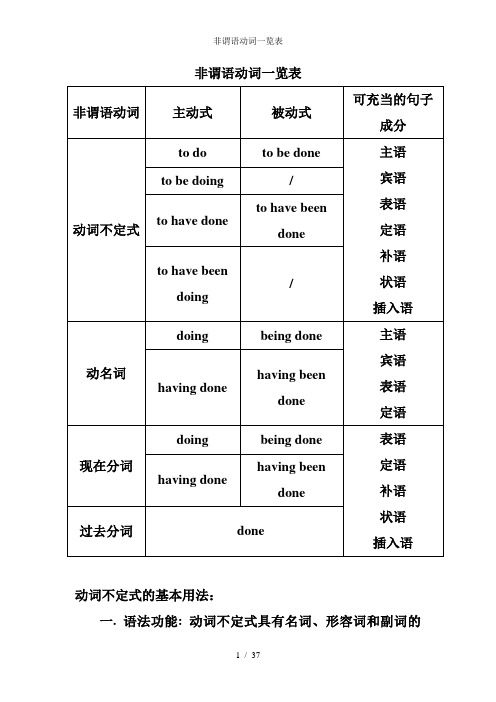
非谓语动词一览表动词不定式的基本用法:一. 语法功能: 动词不定式具有名词、形容词和副词的特征,因此在句中可作主语、宾语、表语、定语、宾语补足语(主语补足语)、状语以及插入语(独立成分),唯独不可作谓语。
(主语)To scold her would not be just.(宾语)We are planning to build a Disney park here.(宾补)They hurriedly ended the meeting, leaving many problems to be settled.(表语)Our most urgent task is to make a careful analysis of the present situation.仔细分析当前的形势是我们最迫切的任务。
(定语)Do you have anything else to add? 还有什么要补充的吗(目的状语)Learn from past mistakes to avoid future ones. 惩前毖后。
(结果状语)He made a long speech only to show his ignorance of the subject.他大讲了一通,只暴露他对这门学科的无知。
(程度状语)I don’t know her to speak to.我认识她还不到能与她谈话的程度。
(原因状语) We shall be happy to co-operate with you in the work.(独立成分) To put it another way, do you like him?To be honest,I don’t know anything about it.I. 作主语:1. To say is easier than to do. =Saying is easier than doing.2. To see is to believe. =Seeing is believing.3. How to go there h asn’t been decided yet.4. Who to blame for the traffic accident is still a puzzle.5. Whether to go or stay is not known.6. It is important to study English well and go to college.7. It is our duty to give a hand to people in trouble.8. It takes me three hours to do house cleaning on Sundays.9. To master a foreign language is very important。
非谓语动词(表格总结)
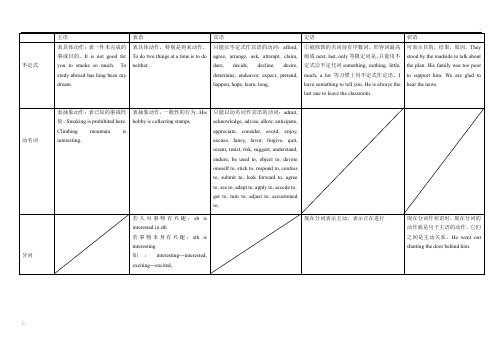
动名词
表抽象动作;表已知的事或经验。Smoking is prohibited here. Climbing mountain is interesting.
只能以不定式作宾语的动词:afford, agree, arrange, ask, attempt, claim, dare, decide, decline, desire, determine, endeavor, expect, pretend, happen, hope, learn, long,
表抽象动作,一般性的行为。His hobby is collecting stamps.
只能以动名词作宾语的动词:admit, acknowledge, advise, allow, anticipate, appreciate, consider, avoid, enjoy, excuse, fancy, favor, forgive, quit, resent, resist, risk, suggest, understand, endure, be used to, object to, devote oneself to, stick to, respond to, confess to, submit to, look forward to, agree to, see to, adapt to, apply to, accede to,
主语
表语
宾语
非谓语动词表格形式
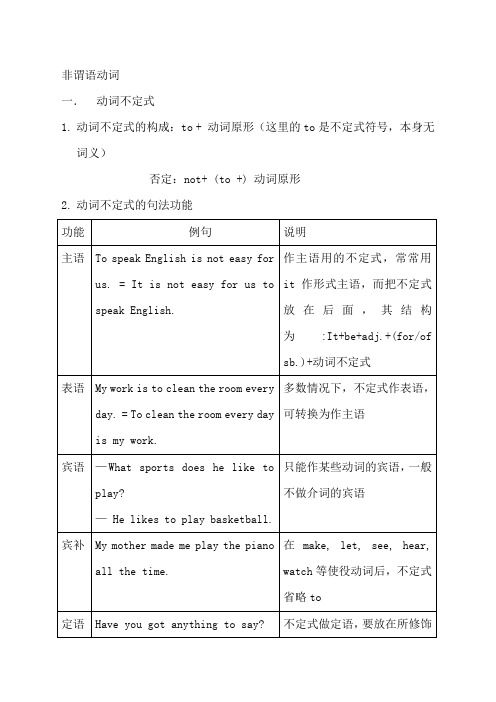
非谓语动词一.动词不定式1.动词不定式的构成:to + 动词原形(这里的to是不定式符号,本身无词义)否定:not+ (to +) 动词原形2.动词不定式的句法功能1.to do 作主语常用it 作形式主语例: To learn English well is useful. → It is useful(for us)to learn English well.注意:在kind, good, nice, clever等表示人的品质的形容词后,不用for而用of.2.一些表示命令,打算或希望的动词后只接动词不定式作宾语:would like, like(想要), want, wish, hope, decide, plan, except等。
例:Would you like too see a film this evening?3.在find, think后跟动词不定式作宾语时,常用it代替,而将真正的宾语放在句末。
例:I find it easy to read English every day.4.常见的一些不带to 的动词不定式作宾语Why not do ……, why don’t you do…, had better (not) do…, would rater do…, could/ would/ will you please (not) do…例: I would rather stay in the room.5.一些使役动词和感官动词用不定式作宾语,但to要省略。
一感(fell)、二听(hear, listen to)、三让(let/ make/ let)、四看(look at, see, watch, notice)、五帮助(help),但变为被动语态是必须加上to.例:My friends were made to work the whole night by the boss.6.不定式常和疑问词what,which,when,where,how连用,相当于一个宾语从句。
- 1、下载文档前请自行甄别文档内容的完整性,平台不提供额外的编辑、内容补充、找答案等附加服务。
- 2、"仅部分预览"的文档,不可在线预览部分如存在完整性等问题,可反馈申请退款(可完整预览的文档不适用该条件!)。
- 3、如文档侵犯您的权益,请联系客服反馈,我们会尽快为您处理(人工客服工作时间:9:00-18:30)。
非谓语动词一览表动词不定式的基本用法:一. 语法功能: 动词不定式具有名词、形容词和副词的特征,因此在句中可作主语、宾语、表语、定语、宾语补足语(主语补足语)、状语以及插入语(独立成分),唯独不可作谓语。
(主语)To scold her would not be just.(宾语)We are planning to build a Disney park here.(宾补)They hurriedly ended the meeting, leaving many problems to be settled.(表语)Our most urgent task is to make a careful analysis of the present situation.仔细分析当前的形势是我们最迫切的任务。
(定语)Do you have anything else to add? 还有什么要补充的吗(目的状语)Learn from past mistakes to avoid future ones. 惩前毖后。
(结果状语)He made a long speech only to show his ignorance of the subject.他大讲了一通,只暴露他对这门学科的无知。
(程度状语)I don’t know her to speak to.我认识她还不到能与她谈话的程度。
(原因状语) We shall be happy to co-operate with you in the work.(独立成分) To put it another way, do you like him?To be honest,I don’t know anything about it.I. 作主语:1. To say is easier than to do. =Saying is easier than doing.2. To see is to believe. =Seeing is believing.3. How to go there h asn’t been decided yet.4. Who to blame for the traffic accident is still a puzzle.5. Whether to go or stay is not known.6. It is important to study English well and go to college.7. It is our duty to give a hand to people in trouble.8. It takes me three hours to do house cleaning on Sundays.9. To master a foreign language is very important。
=It is very important t o m a s t e r a f o r e i g n l a n g u a g e.【总结归纳】不定式作主语,用It代替主语,而把不定式后置,常见句型:1.It is + adj. (important, possible, impossible, necessary, hard, difficult, easy,strange, natural,…) + (for sb.) to do sth.It is + adj. ( honest, brave, foolish, clever, careful, kind,wise, careless, good, nice, silly, stupid,impolite…) +(of sb.) to do sth.eg: It is quite necessary for us to learn English well.It was very brave of you to jump into the river to save the girl.I n f a c t,i t i s a h a r d j o b f o r t h e p o l i c e t o k e e p o r d e r i n a ni m p o r t a n t f o o t b a l l m a t c h.It is kind of you to help me. = You are kind to help me .I t w a s f o o l i s h o f y o u t o b e l i e v e h i m.=I i i s f o o l i s h o f y o u t o h a v e b e l i e v e d h i mright, wrong既可用于for sb. to do sth. 也可用于of sb. to do sth.eg.It’s right/wrong for / of him to do the work alone.2.It is + n. (a pity, a pleasure, one’s duty, a shame) + to dosth.eg.It’s my duty to teach you how to be a student of No.3 Middle School.3.It takes/needs/requires + some time (hours, days, patience…) + to do sth.eg:It requires patience to learn English well.4 . It made sb. + adj. (excited, frightened , angry ) + to do sth.eg: It made me delighted to have been invited to give you a speech here.II. 作表语:当句子的主语是aim, idea, policy, question, suggestion, wish, task, duty, job, purpose等或者主语是what引导的名词性从句时,后面可以用不定式做表语,用以说明主语所包含内容。
例如:1. Our most important task now is to make a plan.2. What I would suggest is to start work at once.3. At that time his job was to write reports for the newspaper.4. The problems remain to be unsettled.5. His father’s task is to raise pigs and goats.6. My question is when to start the work.7. The problem is whether to buy a bigger computer.8. The purpose of new technologies is to make life easier,not to make it more difficult.9. ①All that we have to do is(to)practice speaking English every day.②What we have to do is(to)practice speaking English every day.III. 作宾语1. Do you agree to lend him 200 yuan to buy a birthday’s gift?2. They managed to pass the driving test.3. We determine to study English harder than before.4. I don’t know what to do next.5. He refused to accept the present.6. He tried to avoid answering my questions.7. The cat said “Remember not to take it next time!”.【总结归纳】1)只可以接不定式作宾语的动词很多,常见的有:hope, wish, offer, fail, plan, learn, pretend, refuse, manage, help, agree, promise, prefer, afford, expect, ___________________________________________________________etc.2) Eg. We have no choice but to wait.Cf. We can do nothing but wait.3) 用it作形式宾语,宾语补足语后置,find, think,consider, believe, feel, make + it + adj. / n. + to do sth.eg: I find it very interesting to talk with you.Do you think it a pity to miss a wonderful film?Marx found it important to study the situation in Russia.IV. 宾语补足语在SVOC句型中,许多动词都可以跟不定式作宾语补足语。
eg: You should get them to help youJim told me to give his best wishes to everyone here.Parents want their children to develop fully.Please ask John not to turn off the air-condition.He encouraged me to talk to him in English.They are allowed to talk in the classroom after class.He often made his workers work 10 hours a day, but recently he has been made to reduce the worhing hour. 【总结归纳】1) 通常作宾语补语的不定式要带to,常用于以下动词和动词词组之后:want, wish, ask, tell, order, beg, permit, help, advise, persuade, allow, cause, force, invite, warn, forbid, get,vote for, call on, count on, rely on, depend on, long for, wait for等。
